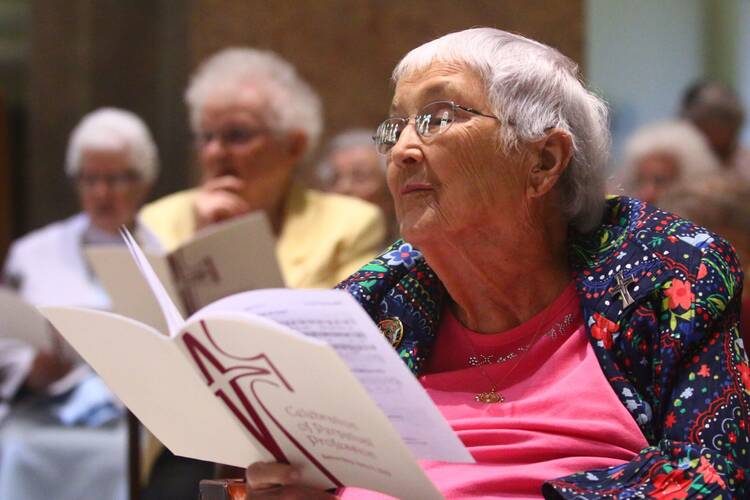SILVER SPRING, Md. (OSV News) -- The Sisters of Mercy of the Americas Aug. 22 announced with sadness the death of Mercy Sister Theresa Kane, 87, who served in many roles during her 69 years of religious life, including being elected in 1978 as president of the Leadership Conference of Women Religious.
It was as LCWR president when, on Oct. 7, 1979, she publicly urged St. John Paul II to provide “the possibility of women being included in all ministries in the church.”
Her remarks came as she welcomed him to the Basilica of the National Shrine of the Immaculate Conception in Washington during his first visit to the United States as pontiff. Although she did not specifically mention women priests, many interpreted her remarks to include the priestly ordination of women.
“Theresa’s ministry was about truth-speaking,” Sister Susan Sanders, president of the Maryland-based Institute Leadership of the Sisters of Mercy of the Americas, said in an Aug. 22 statement. “Truth-speaking about women’s desire for full inclusion in the Church; and truth-speaking to Church leaders like Pope John Paul II.”
“Straightforward and bold as Theresa was, however, she spoke truth as her God and prayer revealed it to her, and not from a place of position or judgment or blame, but from a place of love, respect, humility, and inclusion,” Sister Susan said. “For this, many deeply loved and admired her.”
At the shrine that October, following a morning prayer service, the pope delivered a major address to women religious of the United States. He did not address the issue of women priests, and instead emphasized the traditional role of religious sisters in the church.
However, in an address in Philadelphia three days earlier, on Oct. 4, he said the church’s “traditional decision to call men to the priesthood, and not to call women, is not a statement about human rights, nor an exclusion of women” from the church’s “holiness and mission.”
“Rather this decision expresses the conviction of the Church about this particular dimension of the gift of priesthood by which God has chosen to shepherd his flock,” he said.
Sister Theresa made headlines with her comments to the pope, drawing praise from many and criticism from some who thought she was being impertinent to the pope.
In a brief statement released by the Sisters of Mercy Oct. 8, 1979, Sister Theresa reaffirmed her “respect for and fidelity to the Holy Father. I appreciated the opportunity to greet the Holy Father and it was his openness that encouraged me to express a concern experienced by me and many other women across the country. It is my hope that such opportunities will increase when women can dialogue further with the Holy Father about such concerns as I expressed yesterday.”
A year later, Sister Theresa received the 1980 U.S. Catholic magazine award for furthering the cause of women in the church. Claretian Father Mark J. Brummel, then editor of U.S. Catholic, said she had “revived a traditional and perhaps painful meaning to the word ‘loyalty.’” He also told her: “Women long to serve the church in roles now denied them. You expressed that longing.”
During her years of religious life, she was an educator, a health care administrator and a congregational national leader who served in numerous leadership roles.
Born in 1936 to Irish immigrants from County Galway, Sister Theresa and her six siblings were raised by their parents in the Bronx, a borough of New York City. She entered the Sisters of Mercy in 1955 in Tarrytown, New York. She received a bachelor of arts degree in economics in 1959 from Manhattanville College, a master’s degree in public administration from New York University in 1986, and a master’s in women’s history from Sarah Lawrence College in 1993.
She began her ministry as the finance manager of St. Francis Hospital in Port Jervis, New York, and was named administrator of that institution in 1964. She served for seven years in leadership of the then New York Province of the Sisters of Mercy before being elected President of the Religious Sisters of Mercy of the Union (a union of nine provinces that later joined 16 other Mercy congregations to become the Institute of the Sisters of Mercy of the Americas) in 1977.
During the 1980s, Sister Theresa served as the campus minister at Our Lady of Victory Academy in Dobbs Ferry, New York, and the fiscal director of Mercy Healthcare Center. In 1992 she was named administrator of Mercy College (now Mercy University), and in 1996 became associate professor of behavioral sciences at the school.
She was a founding member of the Intercommunity Center for Justice and Peace in New York, a U.S. representative to the Union of International Superiors General, board member and president of the Washington Office on Latin America, founding member and first vice president of the board of the Association for the Rights of Catholics in the Church, and a board member of the National Catholic Reporter, among other roles.
She was the recipient of the Presidential Medal from Mercy College in Dobbs Ferry and the 1999 National Catholic Leadership Award from Call to Action. Funeral arrangements were pending.








